SEO
ChatGPT Vs. Bard Vs. Bing: What Are The Differences?
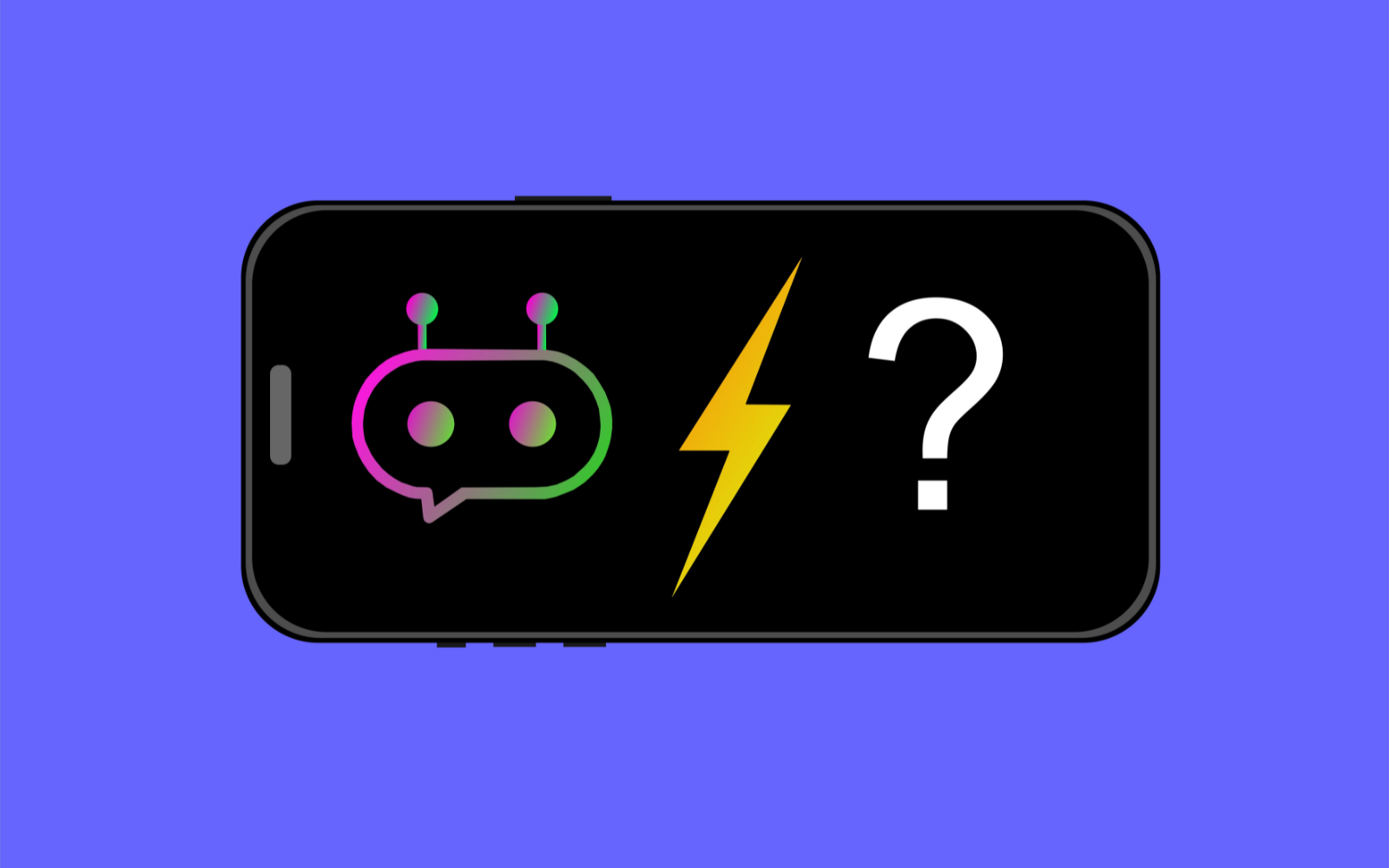
Chatbots are taking the world by storm.
SEO pros, writers, agencies, developers, and even teachers are discussing the changes that this technology will cause in society and how we work in our day-to-day lives.
ChatGPT’s release on November 30, 2022 led to a cascade of competition, including Bard and Bing, although the latter runs on OpenAI’s technology.
If you want to search for information, need help fixing bugs in your CSS, or want to create something as simple as a robots.txt file, chatbots may be able to help.
They’re also wonderful for topic ideation, allowing you to draft more interesting emails, newsletters, blog posts, and more.
But which chatbot should you use and learn to master? Which platform provides accurate, concise information?
Let’s find out.
What Is The Difference Between ChatGPT, Google Bard, And Bing Chat?
| ChatGPT | Bard | Bing | |
| Pricing | ChatGPT’s original version remains free to users. ChatGPT Plus is available for $20/month. | Free for users who joined the waitlist and are accepted. | Free for users who are accepted after joining the waitlist. |
| API | Yes, but on a waitlist. | N/A | N/A |
| Developer | OpenAI | Alphabet/Google | OpenAI |
| Technology | GPT-4 | LaMDA | GPT-4 |
| Information Access | Training data with a cutoff date of 2021. The chatbot does state that it has been trained beyond this year, although it won’t include that information. | Real-time access to the data Google collects from search. | Real-time access to Bing’s search data. |
Wait! What Is GPT? What Is LaMDA?
ChatGPT uses GPT technology, and Bard uses LaMDA, meaning they’re different “under the hood.” This is why there’s some backlash against Bard. People expect Bard to be GPT, but that’s not the intent of the product.
Also, although Bing has chosen to collaborate with OpenAI, it uses fine-tuning, which allows it to tune responses for the end user.
Since Bing and Bard are both available on such a wide scale, they have to tune the responses to maintain their brand image and adhere to internal policies that aren’t as restrictive in ChatGPT – at the moment.
GPT: Chat Generative Pre-trained Transformer
GPTs are trained on tons of data using a two-phase concept called “unsupervised pre-training and then fine-tuning.” Imagine consuming billions of data points, and then someone comes along after you gain all of this knowledge to fine-tune it. That’s what is happening behind the scenes when you prompt ChatGPT.
ChatGPT had 175 billion parameters that it has used and learned from, including:
- Articles.
- Books.
- Websites.
- Etc.
While ChatGPT is limited in its datasets, OpenAI has announced a browser plugin that can use real-time data from websites when responding back to you. There are also other neat plugins that amplify the power of the bot.
LaMDA Stands For Language Model For Dialogue Applications
Google’s team decided to follow a LaMDA model for its neural network because it is a more natural way to respond to questions. The goal of the team was to provide conversational responses to queries.
The platform is trained on conversations and human dialog, but it is also apparent that Google uses search data to provide real-time data.
Google uses an Infiniset of data, which are datasets that we really don’t know much about at this point, as Google has kept this information private.
Since these bots are learning from sources worldwide, they also have a tendency to provide false information.
Hallucinations Can Happen
Chatbots can hallucinate, but they’re also very convincing in their responses. It’s important to heed the warning of the developers.
Google tells us:
Bing also tells us:
 Screenshot from Bing Chat, April 2023
Screenshot from Bing Chat, April 2023If you’re using chatbots for anything that requires facts and studies, be sure to crosscheck your work and verify that the facts and events actually happened.
There have been times when these hallucinations are apparent and other times when non-experts would easily be fooled by the response they receive.
Since chatbots learn from information, such as websites, they’re only as accurate as the information they receive – for now.
With all of these cautions in mind, let’s start prompting each bot to see which provides the best answers.
ChatGPT Vs. Bard Vs. Bing: Prompt Testing And Examples
Since technical SEO is an area I am passionate about, I wanted to see what the chatbots have to say when I put the following prompt in each:
What Are The Top 3 Technical SEO Factors I Can Use To Optimize My Site?
ChatGPT’s Response
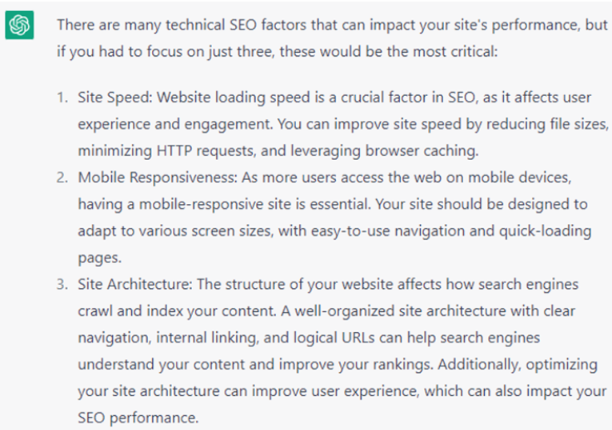 Screenshot from ChatGPT, April 2023
Screenshot from ChatGPT, April 2023ChatGPT provides a coherent, well-structured response to this query. The response does touch on three important areas of optimization:
- Site speed.
- Mobile responsiveness.
- Site architecture.
When prompted to provide more information on site speed, we receive a lot of great information that you can use to begin optimizing your site.
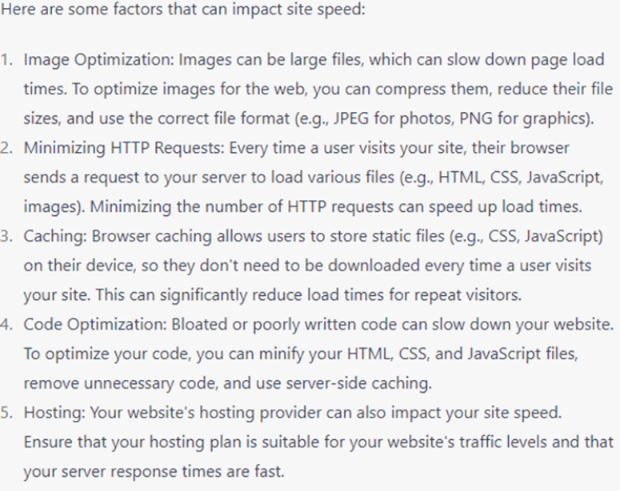 Screenshot from ChatGPT, April 2023
Screenshot from ChatGPT, April 2023If you’ve ever tried to optimize your site’s speed before, you know just how important all of these factors are for improving your site speed.
ChatGPT mentions browser caching, but what about server-side caching?
When site speed is impacted by slow responses for database queries, server-side caching can store these queries and make the site much faster – beyond a browser cache.
Bard’s Response
Bard’s responses are faster than ChatGPT, and I do like that you can view other “drafts” from Bard if you like. I went with the first draft, which you can see below.
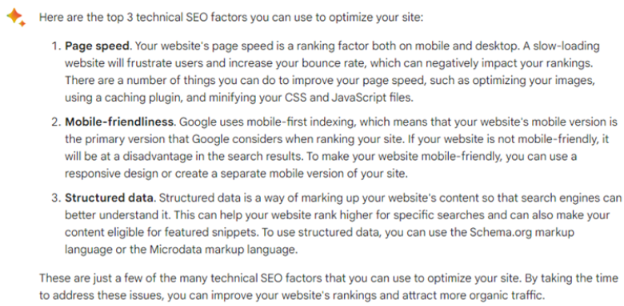 Screenshot from Google Bard, April 2023
Screenshot from Google Bard, April 2023The information is solid, and I do appreciate that Google uses more formatting and bolds parts of the responses to make them easier to read.
Structured data was a nice addition to the list, and Bard even mentions Schema.org in its response.
To try and keep things similar, I asked Bard, “Can you elaborate on site speed?”
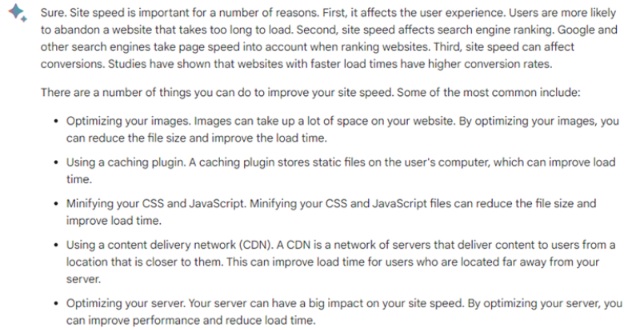 Screenshot from Google Bard, April 2023
Screenshot from Google Bard, April 2023You can certainly find similarities between ChatGPT’s and Bard’s responses about optimization, but some information is a bit off. For example:
“A caching plugin stores static files on the user’s computer, which can improve load time.”
Caching plugins, often installed on your content management system (CMS), will store files on your server, a content delivery network (CDN), in memory, and so on.
However, the response from Bard indicates that the plugin will store static files on the user’s computer, which isn’t entirely wrong, but it’s odd.
Browsers will cache files automatically on their own, and you can certainly manipulate the cache with a Cache-Control or Expires header.
However, caching plugins can do so much more to improve site speed. I think Bard misses the mark a bit, as well as ChatGPT.
Bing’s Response
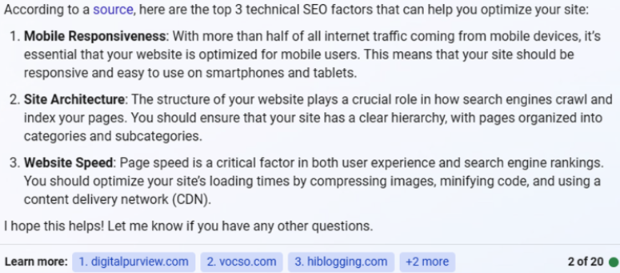 Screenshot from Bing Chat, April 2023
Screenshot from Bing Chat, April 2023Bing is so hard to like because, for years, it has missed the mark in search. Is Chat any better? As an SEO and content creator, I love the fact that Bing provides sources in its responses.
I think for content creators that have relied on traffic from search for so long, citing sources is important. Also, when I want to verify a claim, these citations provide clarity that ChatGPT and Google Bard cannot.
The answers are similar to Bard and GPT, but let’s see what it produces when we ask for it to elaborate a little more:
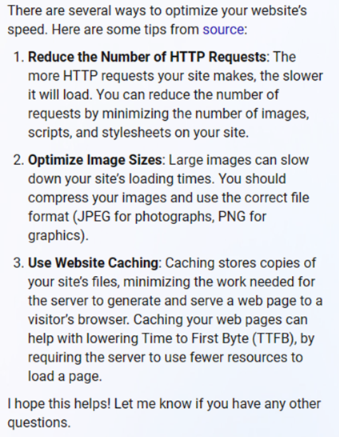 Screenshot from Bing Chat, April 2023
Screenshot from Bing Chat, April 2023Bing elaborated less than ChatGPT and Bard, providing just three points in its response. But can you spot the overlap between this response and the one from ChatGPT?
- Bing: You should compress your images and use the correct file format (JPEG for photographs, PNG for graphics).
- ChatGPT: You can compress them, reduce their file sizes, and use the correct file format (e.g., JPEG for photos, PNG for graphics).
The responses are going to be very similar for this type of answer, but neither mentioned using a format like WebP. They both seem to be lacking in this regard. Perhaps there’s just more data for optimizing JPEG and PNG files, but will this change?
This is an interesting concept because what if thousands of articles are created to provide the wrong advice, such as eliminating images completely?
Let’s move on to website caching. Bing’s response is a little more in-depth, explaining what caching can help you achieve, such as a lower time to first byte (TTFB).
Winner: Bing. I thought ChatGPT would win this query, but it turns out Bing provides a little more information on caching and wins out in the “technical” arena. Bard and ChatGPT did provide more solutions for improving your site speed.
Who Is Ludwig Makhyan?
All chatbots knew a little something about technical SEO, but how about me? Let’s see what happens when I ask them about myself:
ChatGPT’s Response
 Screenshot from ChatGPT, April 2023
Screenshot from ChatGPT, April 2023ChatGPT couldn’t find any information about me, which is understandable. I’m not Elon Musk or a famous person, but I did publish a few articles on this very blog you’re reading now before the data cutoff date of ChatGPT.
I have a feeling that Bing and Bard will do a little better for this query.
Bard’s Response
 Screenshot from Google Bard, April 2023
Screenshot from Google Bard, April 2023Hmm. The first sentence seems a bit familiar. It came directly from my Search Engine Journal bio, word-for-word. The last sentence in the first paragraph also comes word-for-word from another publication that I write for: “He is the co-founder at MAZELESS, an enterprise SEO agency.”
I’m also not the author of either of these books, although I’ve talked about these topics in great detail before.
Unfortunately, pulling full sentences from sources and providing false information means Bard failed this test. You could argue that there are a few ways to rephrase those sentences, but the response could certainly be better.
Bing’s Response
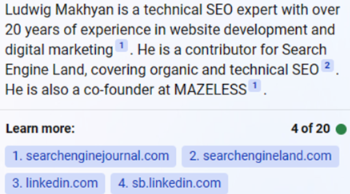 Screenshot from Bing Chat, April 2023
Screenshot from Bing Chat, April 2023Bing also took my profile information directly, and most of the other information is the same, too. Bing does provide a much shorter response and links to the sources.
From this data, it seems to me that there needs to be a lot of references for chatbots to work from to define a person. But let’s see what these bots can do with a better prompt that is a bit more advanced.
Advanced Prompt: I Want To Become An Authority In SEO. What Steps Should I Take To Reach This Goal?
Up until this point, the prompts have been a bit easy. Let’s find out how each chatbot performs when we use more advanced prompts:
ChatGPT’s Response
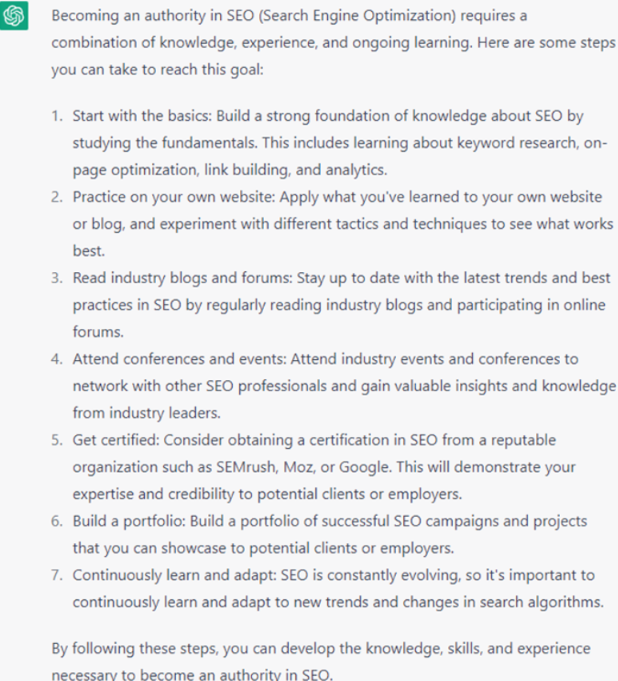 Screenshot from ChatGPT, April 2023
Screenshot from ChatGPT, April 2023Bard’s Response
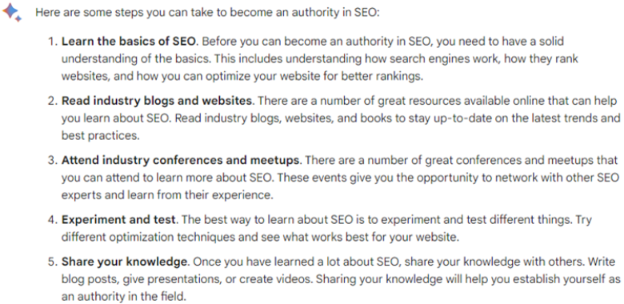 Screenshot from Google Bard, April 2023
Screenshot from Google Bard, April 2023Bing’s Response
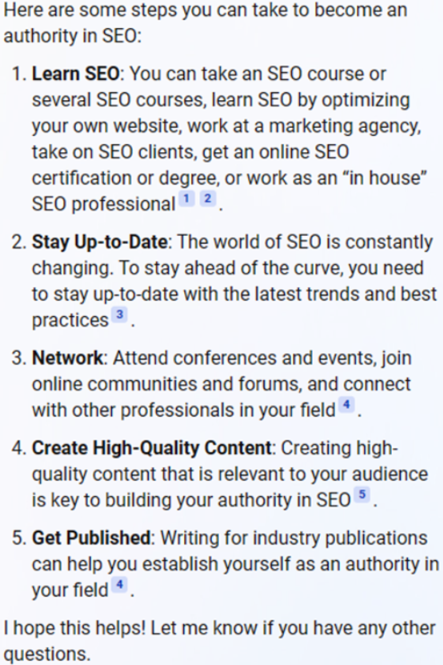 Screenshot from Bing Chat, April 2023
Screenshot from Bing Chat, April 2023ChatGPT provides me with more “light bulb” moments, explaining that I should learn things like keyword research, on-page optimization, and link building.
Knowledge seemed to be the core of the recommendations from ChatGPT, but it would have been nice if it mentioned anything about getting published.
Overall, these tips are very similar, but ChatGPT was my favorite. Let’s try putting these chatbots to work on some tasks that I’m sure they can perform.
Advanced Prompt: Create A Robots.txt File Where I Block Google Search Bot, Hide My “Private” Folder, And Block The Following IP Address “123.123.123.123”
ChatGPT’s Response
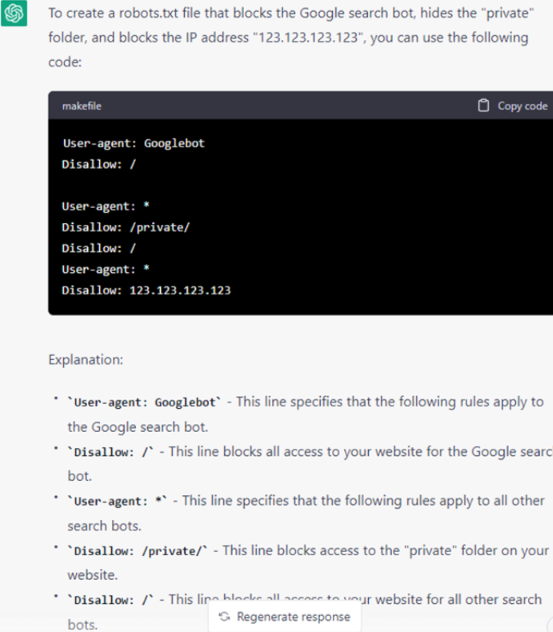 Screenshot from ChatGPT, April 2023
Screenshot from ChatGPT, April 2023ChatGPT listened to my directions, reiterated them to me, showed me a makefile for the robots.txt, and then explained the parameters to use. I’m impressed.
Bard’s Response
 Screenshot from Google Bard April 2023
Screenshot from Google Bard April 2023Google! Are you assuming that you’re the only search bot in the world because you’re blocking everyone? Unfortunately, Bard uses the “*” as an agent, meaning every search engine is blocked from going to my site – not just Google.
Interestingly, when I repeated the question to block Bing on a fresh chat, it provided the same answer. But when I asked the question a second time in a row, it provided a much better answer with some comments:
 Screenshot from Google Bard, April 2023
Screenshot from Google Bard, April 2023Bing’s Response
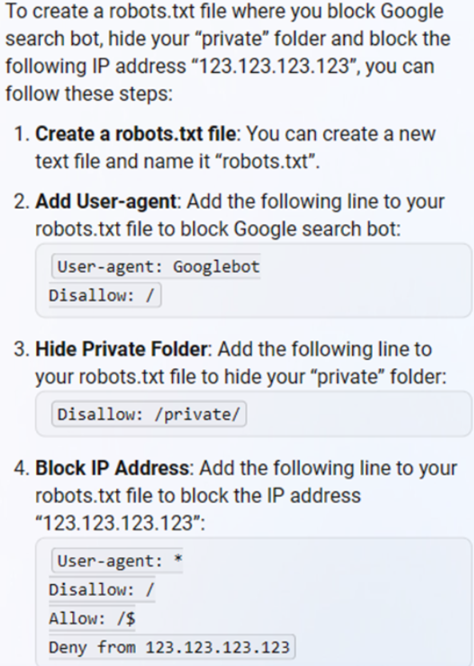 Screenshot from Bing Chat, April 2023
Screenshot from Bing Chat, April 2023Bing tries hard, and I appreciate the explanation that it provides. However, it’s a bit strange. We’re disallowing all bots using “/” and then allowing using “/$,” which allows them to crawl the homepage and nothing else and then denying a certain IP address.
ChatGPT wins this test because it provides a clean and easy way to make your robots.txt file. The other two examples need some fine-tuning and will have undesired consequences if you simply copy and paste them into your robots.txt file.
Advanced Prompt: What Are The Top 3 Destinations In Italy To Visit, And What Should I Know Before Visiting Them?
ChatGPT’s Response
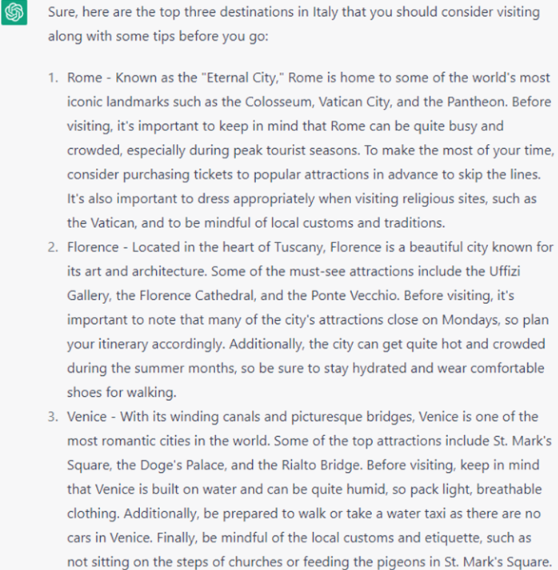 Screenshot from ChatGPT, April 2023
Screenshot from ChatGPT, April 2023ChatGPT does a nice job with its recommended places and provides useful tips for each that are on the same point. I also like how “St. Mark’s Square” was used, showing the bot being able to discern that “Piazza San Marco” is called “St. Mark’s Square” in English.
As a follow-up question, I asked what sunglasses to wear in Italy during my trip, and the response was:
 Screenshot from ChatGPT, April 2023
Screenshot from ChatGPT, April 2023This was a long shot, as the AI doesn’t know my facial shape, likes and dislikes, or interests in fashion. But it did recommend some of the popular eyewear, like the world-famous Ray-Ban Aviators.
Bard’s Response
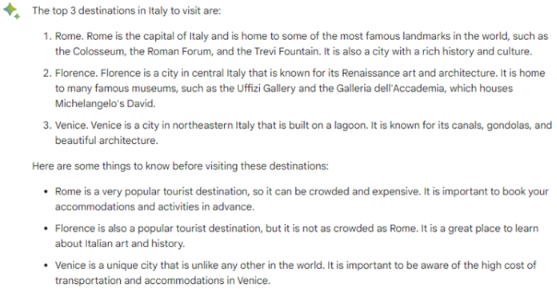 Screenshot from Google Bard, April 2023
Screenshot from Google Bard, April 2023Bard did really well here, and I actually like the recommendations that it provides.
Reading this, I know that Rome is crowded and expensive, and if I want to learn about Italian art, I can go to the Uffizi Gallery when I’m in Florence.
Just out of curiosity, I looked at the second draft from Bard, and it was even better than the first.
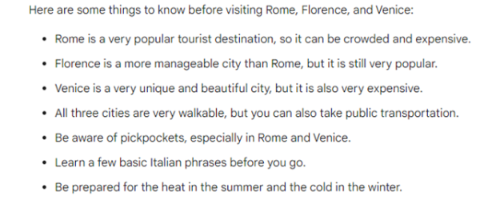 Screenshot from Google Bard, April 2023
Screenshot from Google Bard, April 2023This is the “things to know” section, which is certainly more insightful than the first response. I learned that the cities are walkable, public transport is available, and pickpocketing is a problem (I was waiting for this to be mentioned).
The third draft was much like the first, but I’m learning something about Bard throughout all of this.
Bard seems to have answers with great insights, but it’s not always the first draft or response that the bot gives. If Google corrects this issue, it might provide even better answers than Bing and ChatGPT.
When I asked about sunglasses to wear, it came up with similar answers as ChatGPT, but even more specific models. Again Bard doesn’t know much about me personally:
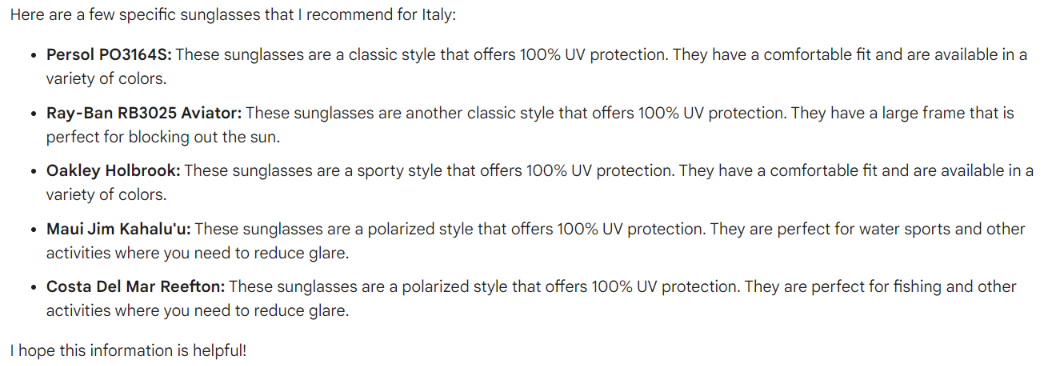 Screenshot from Google Bard, April 2023
Screenshot from Google Bard, April 2023Bing’s Response
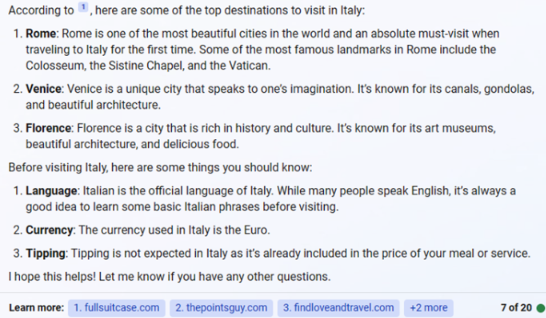 Screenshot from Bing Chat, April 2023
Screenshot from Bing Chat, April 2023Bing did very well with its response, but it’s curious that it says, “According to 1,” because it would be much nicer to put the site or publication’s name in the place of the number one. The responses are all accurate, albeit very short.
Bard wins this query because it provides more in-depth, meaningful answers. The bot even recommended some very good places to visit in each area, which Bing failed to do. ChatGPT did do well here, too, but the win goes to Bard.
And for the sunglasses query, you be the judge. Some of the recommendations in the list may be out of range for many travelers:
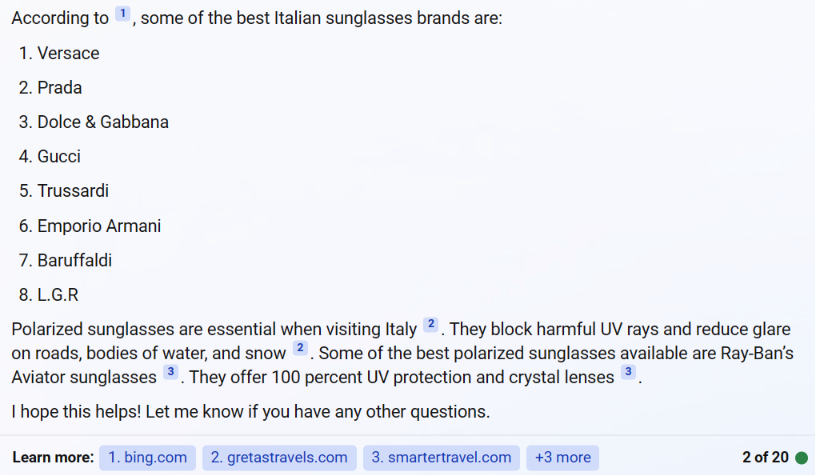 Screenshot from Bing Chat, April 2023
Screenshot from Bing Chat, April 2023But I did notice the same Aviator sunglasses in the summary.
Which Chatbot Is Better At This Stage?
Each tool has its own strengths and weaknesses.
It’s clear that Bard lacks in its initial response, although it’s quick and provides decent answers. Bard has a nice UI, and I believe it has the answers. But I also think it has some “brain fog,” or should we call it “bit fog?”
Bing’s sources are a nice touch and something I hope all of these chatbots eventually incorporate.
The platform is nice to use, but I’m hearing ads are being integrated into it, which will be interesting. Will ads take priority in chat? For example, if I asked my last question about Italy, would ads:
- Gain priority in what information is displayed?
- Cause misinformation? For example, would the top pizza place be paid ad from a place with horrible reviews instead of the top-rated pizzeria?
ChatGPT, Bard, and Bing are all interesting tools, but what does the future hold for publishers and users? That’s something I cannot answer. No one can yet.
And There’s Also The Major Question: Is AI “Out Of Control?”
Elon Musk, Steve Wozniak, and over a thousand other leaders in tech, AI, ethics, and more are calling for a six-month pause on AI beyond GPT-4.
The pause is not to hinder progress but to allow time to understand the “profound risks to society and humanity.”
These leaders are asking for time to develop and implement measures to ensure that AI tools are safe and are asking governments to create a moratorium to address the issues.
What are your thoughts on these AI tools? Should we pause anything beyond GPT-4 until new measures are in place?
More Resources:
Featured Image: Legendary4/Shutterstock
SEO
WordPress Insiders Discuss WordPress Stagnation

A recent webinar featuring WordPress executives from Automattic and Elementor, along with developers and Joost de Valk, discussed the stagnation in WordPress growth, exploring the causes and potential solutions.
Stagnation Was The Webinar Topic
The webinar, “Is WordPress’ Market share Declining? And What Should Product Businesses Do About it?” was a frank discussion about what can be done to increase the market share of new users that are choosing a web publishing platform.
Yet something that came up is that there are some areas that WordPress is doing exceptionally well so it’s not all doom and gloom. As will be seen later on, the fact that the WordPress core isn’t progressing in terms of specific technological adoption isn’t necessarily a sign that WordPress is falling behind, it’s actually a feature.
Yet there is a stagnation as mentioned at the 17:07 minute mark:
“…Basically you’re saying it’s not necessarily declining, but it’s not increasing and the energy is lagging. “
The response to the above statement acknowledged that while there are areas of growth like in the education and government sectors, the rest was “up for grabs.”
Joost de Valk spoke directly and unambiguously acknowledged the stagnation at the 18:09 minute mark:
“I agree with Noel. I think it’s stagnant.”
That said, Joost also saw opportunities with ecommerce, with the performance of WooCommerce. WooCommerce, by the way, outperformed WordPress as a whole with a 6.80% year over year growth rate, so there’s a good reason that Joost was optimistic of the ecommerce sector.
A general sense that WordPress was entering a stall however was not in dispute, as shown in remarks at the 31:45 minute mark:
“… the WordPress product market share is not decreasing, but it is stagnating…”
Facing Reality Is Productive
Humans have two ways to deal with a problem:
- Acknowledge the problem and seek solutions
- Pretend it’s not there and proceed as if everything is okay
WordPress is a publishing platform that’s loved around the world and has literally created countless jobs, careers, powered online commerce as well as helped establish new industries in developing applications that extend WordPress.
Many people have a stake in WordPress’ continued survival so any talk about WordPress entering a stall and descent phase like an airplane that reached the maximum altitude is frightening and some people would prefer to shout it down to make it go away.
Acknowledging facts and not brushing them aside is what this webinar achieved as a step toward identifying solutions. Everyone in the discussion has a stake in the continued growth of WordPress and their goal was to put it out there for the community to also get involved.
The live webinar featured:
- Miriam Schwab, Elementor’s Head of WP Relations
- Rich Tabor, Automattic Product Manager
- Joost de Valk, founder of Yoast SEO
- Co-hosts Matt Cromwell and Amber Hinds, both members of the WordPress developer community moderated the discussion.
WordPress Market Share Stagnation
The webinar acknowledged that WordPress market share, the percentage of websites online that use WordPress, was stagnating. Stagnation is a state at which something is neither moving forward nor backwards, it is simply stuck at an in between point. And that’s what was openly acknowledged and the main point of the discussion was understanding the reasons why and what could be done about it.
Statistics gathered by the HTTPArchive and published on Joost de Valk’s blog show that WordPress experienced a year over year growth of 1.85%, having spent the year growing and contracting its market share. For example, over the latest month over month period the market share dropped by -0.28%.
Crowing about the WordPress 1.85% growth rate as evidence that everything is fine is to ignore that a large percentage of new businesses and websites coming online are increasingly going to other platforms, with year over year growth rates of other platforms outpacing the rate of growth of WordPress.
Out of the top 10 Content Management Systems, only six experienced year over year (YoY) growth.
CMS YoY Growth
- Webflow: 25.00%
- Shopify: 15.61%
- Wix: 10.71%
- Squarespace: 9.04%
- Duda: 8.89%
- WordPress: 1.85%
Why Stagnation Is A Problem
An important point made in the webinar is that stagnation can have a negative trickle-down effect on the business ecosystem by reducing growth opportunities and customer acquisition. If fewer of the new businesses coming online are opting in for WordPress are clients that will never come looking for a theme, plugin, development or SEO service.
It was noted at the 4:18 minute mark by Joost de Valk:
“…when you’re investing and when you’re building a product in the WordPress space, the market share or whether WordPress is growing or not has a deep impact on how easy it is to well to get people to, to buy the software that you want to sell them.”
Perception Of Innovation
One of the potential reasons for the struggle to achieve significant growth is the perception of a lack of innovation, pointed out at the 16:51 minute mark that there’s still no integration with popular technologies like Next JS, an open-source web development platform that is optimized for fast rollout of scalable and search-friendly websites.
It was observed at the 16:51 minute mark:
“…and still today we have no integration with next JS or anything like that…”
Someone else agreed but also expressed at the 41:52 minute mark, that the lack of innovation in the WordPress core can also be seen as a deliberate effort to make WordPress extensible so that if users find a gap a developer can step in and make a plugin to make WordPress be whatever users and developers want it to be.
“It’s not trying to be everything for everyone because it’s extensible. So if WordPress has a… let’s say a weakness for a particular segment or could be doing better in some way. Then you can come along and develop a plug in for it and that is one of the beautiful things about WordPress.”
Is Improved Marketing A Solution
One of the things that was identified as an area of improvement is marketing. They didn’t say it would solve all problems. It was simply noted that competitors are actively advertising and promoting but WordPress is by comparison not really proactively there. I think to extend that idea, which wasn’t expressed in the webinar, is to consider that if WordPress isn’t out there putting out a positive marketing message then the only thing consumers might be exposed to is the daily news of another vulnerability.
Someone commented in the 16:21 minute mark:
“I’m missing the excitement of WordPress and I’m not feeling that in the market. …I think a lot of that is around the product marketing and how we repackage WordPress for certain verticals because this one-size-fits-all means that in every single vertical we’re being displaced by campaigns that have paid or, you know, have received a a certain amount of funding and can go after us, right?”
This idea of marketing being a shortcoming of WordPress was raised earlier in the webinar at the 18:27 minute mark where it was acknowledged that growth was in some respects driven by the WordPress ecosystem with associated products like Elementor driving the growth in adoption of WordPress by new businesses.
They said:
“…the only logical conclusion is that the fact that marketing of WordPress itself is has actually always been a pain point, is now starting to actually hurt us.”
Future Of WordPress
This webinar is important because it features the voices of people who are actively involved at every level of WordPress, from development, marketing, accessibility, WordPress security, to plugin development. These are insiders with a deep interest in the continued evolution of WordPress as a viable platform for getting online.
The fact that they’re talking about the stagnation of WordPress should be of concern to everybody and that they are talking about solutions shows that the WordPress community is not in denial but is directly confronting situations, which is how a thriving ecosystem should be responding.
Watch the webinar:
Is WordPress’ Market share Declining? And What Should Product Businesses Do About it?
Featured Image by Shutterstock/Krakenimages.com
SEO
Google’s New Support For AVIF Images May Boost SEO

Google announced that images in the AVIF file format will now be eligible to be shown in Google Search and Google Images, including all platforms that surface Google Search data. AVIF will dramatically lower image sizes and improve Core Web Vitals scores, particularly Largest Contentful Paint.
How AVIF Can Improve SEO
Getting pages crawled and indexed are the first step of effective SEO. Anything that lowers file size and speeds up web page rendering will help search crawlers get to the content faster and improve the amount of pages crawled.
Google’s crawl budget documentation recommends increasing the speeds of page loading and rendering as a way to avoid receiving “Hostload exceeded” warnings.
It also says that faster loading times enables Googlebot to crawl more pages:
Improve your site’s crawl efficiency
Increase your page loading speed
Google’s crawling is limited by bandwidth, time, and availability of Googlebot instances. If your server responds to requests quicker, we might be able to crawl more pages on your site.
What Is AVIF?
AVIF (AVI Image File Format) is a next generation open source image file format that combines the best of JPEG, PNG, and GIF image file formats but in a more compressed format for smaller image files (by 50% for JPEG format).
AVIF supports transparency like PNG and photographic images like JPEG does but does but with a higher level of dynamic range, deeper blacks, and better compression (meaning smaller file sizes). AVIF even supports animation like GIF does.
AVIF Versus WebP
AVIF is generally a better file format than WebP in terms of smaller files size (compression) and image quality. WebP is better for lossless images, where maintaining high quality regardless of file size is more important. But for everyday web usage, AVIF is the better choice.
See also: 12 Important Image SEO Tips You Need To Know
Is AVIF Supported?
AVIF is currently supported by Chrome, Edge, Firefox, Opera, and Safari browsers. Not all content management systems support AVIF. However, both WordPress and Joomla support AVIF. In terms of CDN, Cloudflare also already supports AVIF.
I couldn’t at this time ascertain whether Bing supports AVIF files and will update this article once I find out.
Current website usage of AVIF stands at 0.2% but now that it’s available to surfaced in Google Search, expect that percentage to grow. AVIF images will probably become a standard image format because of its high compression will help sites perform far better than they currently do with JPEG and PNG formats.
Research conducted in July 2024 by Joost de Valk (founder of Yoast, ) discovered that social media platforms don’t all support AVIF files. He found that LinkedIn, Mastodon, Slack, and Twitter/X do not currently support AVIF but that Facebook, Pinterest, Threads and WhatsApp do support it.
AVIF Images Are Automatically Indexable By Google
According to Google’s announcement there is nothing special that needs to be done to make AVIF image files indexable.
“Over the recent years, AVIF has become one of the most commonly used image formats on the web. We’re happy to announce that AVIF is now a supported file type in Google Search, for Google Images as well as any place that uses images in Google Search. You don’t need to do anything special to have your AVIF files indexed by Google.”
Read Google’s announcement:
Supporting AVIF in Google Search
Featured Image by Shutterstock/Cast Of Thousands
SEO
CMOs Called Out For Reliance On AI Content For SEO

Eli Schwartz, Author of Product-Led SEO, started a discussion on LinkedIn about there being too many CMOs (Chief Marketing Officers) who believe that AI written content is an SEO strategy. He predicted that there will be reckoning on the way after their strategies end in failure.
This is what Eli had to say:
“Too many CMOs think that AI-written content is an SEO strategy that will replace actual SEO.
This mistake is going to lead to an explosion in demand for SEO strategists to help them fix their traffic when they find out they might have been wrong.”
Everyone in the discussion, which received 54 comments, strongly agreed with Eli, except for one guy.
What Is Google’s Policy On AI Generated Content?
Google’s policy hasn’t changed although they did update their guidance and spam policies on March 5, 2024 at the same time as the rollout of the March 2024 Core Algorithm Update. Many publishers who used AI to create content subsequently reported losing rankings.
Yet it’s not said that using AI is enough to merit poor rankings, it’s content that is created for ranking purposes.
Google wrote these guidelines specifically for autogenerated content, including AI generated content (Wayback machine copy dated March 6, 2024)
“Our long-standing spam policy has been that use of automation, including generative AI, is spam if the primary purpose is manipulating ranking in Search results. The updated policy is in the same spirit of our previous policy and based on the same principle. It’s been expanded to account for more sophisticated scaled content creation methods where it isn’t always clear whether low quality content was created purely through automation.
Our new policy is meant to help people focus more clearly on the idea that producing content at scale is abusive if done for the purpose of manipulating search rankings and that this applies whether automation or humans are involved.”
Many in Eli’s discussion were in agreement that reliance on AI by some organizations may come to haunt them, except for that one guy in the discussion
Read the discussion on LinkedIn:
Too many CMOs think that AI-written content is an SEO strategy that will replace actual SEO
Featured Image by Shutterstock/Cast Of Thousands
-

 SEO7 days ago
SEO7 days agoGoogle’s Revamped Documentation Shows 4 Reasons To Refresh Content
-
SEARCHENGINES5 days ago
Daily Search Forum Recap: August 26, 2024
-

 SEARCHENGINES7 days ago
SEARCHENGINES7 days agoGoogle Ranking Bug Fixed, August Core Update Swings, AI Overviews, Google Ads Bug & More
-
SEARCHENGINES4 days ago
Daily Search Forum Recap: August 27, 2024
-

 WORDPRESS7 days ago
WORDPRESS7 days agoHow to Secure Your WordPress Store
-

 AFFILIATE MARKETING7 days ago
AFFILIATE MARKETING7 days agoBusiness Owners are Batting 1,000 With This All-in-One Management Hub
-

 SEARCHENGINES6 days ago
SEARCHENGINES6 days agoGoogle Migrating All To Google Merchant Center Next By September
-
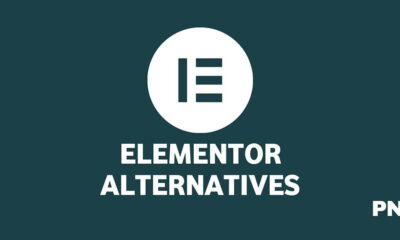
 WORDPRESS5 days ago
WORDPRESS5 days ago9 Best Elementor Alternatives 2024 (Faster Page Builders)














